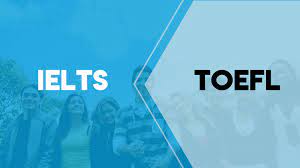IELTS vs. TOEFL: Learn the Key Differences
When it comes to proving English language proficiency for academic or immigration purposes, two standardized tests stand out: the International English Language Testing System (IELTS) and the Test of English as a Foreign Language (TOEFL). Moreover, understanding the key differences between these exams is crucial, especially for individuals aspiring to study or work in English-speaking countries. Consequently, a comprehensive grasp of the distinct features of each test will aid in making informed decisions regarding which examination aligns better with one's goals and linguistic strengths.
IELTS (International English Language Testing System):

IELTS is a globally recognized standardized test designed to assess the English language proficiency of individuals who intend to study, work, or immigrate to English-speaking countries. Moreover, it serves as a crucial benchmark for evaluating linguistic skills, influencing decisions related to academic admissions and immigration processes. Additionally, it serves as a benchmark for evaluating linguistic competence across diverse contexts. It measures a candidate's ability to understand, speak, read, and write in English through four main modules: Listening, Reading, Writing, and Speaking. Furthermore, this comprehensive evaluation allows for a thorough assessment of an individual's language proficiency across various linguistic skills. Additionally, each module plays a crucial role in comprehensively evaluating language proficiency across various skills.
Importance:
Academic and Professional Pursuits: Many universities in the United States use TOEFL scores as part of their admission requirements for international students, thereby ensuring they have the language skills necessary for academic success. Other than that, these scores are often considered a key factor in the admissions process, emphasizing the importance of language proficiency for academic success. Certain professional organizations and licensing bodies also use IELTS scores to evaluate the language proficiency of candidates.
Immigration Requirements: Several countries, including the UK, Australia, Canada, and New Zealand, utilize IELTS scores as a standard measure for English language proficiency in their immigration processes. Other than being a crucial factor in immigration, this recognition underscores the significance of IELTS in assessing language skills for individuals seeking to relocate or establish residency in these nations.
Job Opportunities: In some cases, employers may request IELTS scores as part of the hiring process, especially if the job involves significant communication in English.
Visa Applications: IELTS scores are often required for visa applications, demonstrating an individual's ability to communicate effectively in English when traveling or residing in an English-speaking country.
TOEFL (Test of English as a Foreign Language):

TOEFL is a standardized test that evaluates the English language proficiency of non-native English speakers. In addition, the test measures the ability to understand and use English in an academic setting, with a focus on Reading, Listening, Speaking, and Writing skills. This comprehensive evaluation ensures a well-rounded assessment of language capabilities; consequently, it provides a thorough understanding of a test-taker's proficiency.
Importance:
University Admissions in the United States: Many universities in the United States use TOEFL scores as part of their admission requirements for international students, thereby ensuring they have the language skills necessary for academic success. Additionally, this practice reflects the significance placed on English proficiency in the admissions process.
Scholarship Eligibility: Some scholarship programs may require TOEFL scores to assess the language proficiency of applicants. In addition, this criterion ensures that recipients have the necessary English language skills to excel in their academic pursuits.
Work Opportunities: TOEFL scores are sometimes requested by employers, especially in academic and research positions, to ensure effective communication within the workplace. Additionally, this requirement underscores the importance of strong English language skills in professional contexts.
Visa Applications: TOEFL scores may be required for visa applications in certain countries, thereby indicating the language proficiency of individuals intending to travel or reside in an English-speaking environment. Furthermore, this criterion highlights the crucial role of English proficiency in facilitating successful integration into a new cultural and linguistic setting.
Importance in Summary:
Both IELTS and TOEFL are crucial tools for assessing English language proficiency, playing a pivotal role in facilitating academic, professional, and immigration opportunities for individuals around the world. Their importance lies in providing a standardized measure that institutions, employers, and immigration authorities can use to evaluate an individual's ability to communicate effectively in English. Additionally, this skill is essential for success in diverse international contexts. Understanding the specific requirements and preferences of the institution or organization you are applying to is key to determining whether IELTS or TOEFL is more suitable for your particular goals.
IELTS vs. TOEFL

Test Format
IELTS:
- Listening: In the IELTS Listening module, candidates listen to four recordings representing different accents and conversation styles. Subsequently, this includes monologues and conversations, followed by a set of questions.
- Reading: The Reading module comprises three long texts, ranging from descriptive and factual to discursive and analytical, encompassing a variety of question types. Additionally, this ensures a comprehensive assessment of candidates' reading skills across diverse textual formats.
- Writing: IELTS Writing involves two tasks - Task 1 (report writing) and Task 2 (essay writing), testing candidates on their ability to express ideas coherently and use a range of vocabulary. Moreover, this multifaceted assessment provides a comprehensive evaluation of candidates' writing proficiency.
- Speaking: The Speaking test is a face-to-face interview with an examiner, assessing a candidate's ability to communicate effectively in English. Additionally, this interactive assessment plays a crucial role in evaluating a candidate's spoken language skills in a real-time, conversational setting.
TOEFL:
- Reading: TTOEFL Reading involves reading passages and answering questions, thereby evaluating a candidate's ability to understand and analyze written material. Moreover, this section is designed to assess critical reading skills, including the candidate's capacity to identify main ideas, infer information, and comprehend details within the given text.
- Listening: Candidates listen to lectures, discussions, and conversations, answering questions to demonstrate comprehension.
- Speaking: The TOEFL Speaking section includes six tasks, two of which require candidates to speak on a given topic, while the other four involve responding to prompts based on reading and listening material.
- Writing: TOEFL Writing consists of two tasks - an integrated task requiring the candidate to read and listen before responding, and an independent task where candidates express their opinions on a given topic.
Scoring System
IELTS:
IELTS scores are reported for each section individually and then averaged for an overall band score.
For example, a candidate might score 7 in Listening, 8 in Reading, 7.5 in Writing, and 7 in Speaking, resulting in an overall band score of 7.5.
TOEFL:
TOEFL scores are cumulative, with each section contributing to the overall score.
For example, a candidate might score 25 in Reading, 28 in Listening, 24 in Speaking, and 26 in Writing, adding up to a total score of 103 out of 120.
Accent and Varieties of English
IELTS:
IELTS aims to expose candidates to a wide range of English accents, including British, American, Canadian, and Australian. Furthermore, this diverse exposure enhances the test-taker's ability to comprehend various linguistic nuances.
TOEFL:
TOEFL primarily uses American English, including various accents and dialects encountered in academic settings in the United States. Moreover, this approach ensures that test-takers are well-prepared for the linguistic challenges specific to American English.
Test Duration
IELTS:
The total test time for IELTS is around 2 hours and 45 minutes to 3 hours.
TOEFL:
TOEFL takes approximately 3 hours and 30 minutes to complete.
Purpose and Recognition:
IELTS:
IELTS is widely recognized for immigration purposes and academic admissions in English-speaking countries; moreover, it holds significant importance in nations such as the UK, Australia, Canada, and New Zealand. Additionally, it is a preferred language proficiency assessment for individuals seeking opportunities in these nations.
TOEFL:
TOEFL is often preferred for academic admissions in the United States, although it is recognized globally.
Adaptability
IELTS:
IELTS offers two modules: Academic, typically for those applying to universities, and General Training, also focused on everyday workplace and social situations. Additionally, it caters to a diverse range of language proficiency needs.
TOEFL:
TOEFL primarily caters to academic English proficiency required for university admissions. Moreover, it is a widely recognized test for assessing language skills in an academic context.
IELTS - TOEFL Differences:
| Aspect | IELTS | TOEFL |
| Test Format | Four Modules: Listening, Reading, Writing, Speaking | Four Sections: Reading, Listening, Speaking, Writing (Computer-based Speaking) |
| Scoring System | Band Scale 1-9 with Half-point Increments | Total Score Range: 0-120 (30 points per section) |
| Accent and Varieties of English | Exposure to Various Accents and Dialects | Primarily Uses American English |
| Test Duration | 2 hours 45 minutes to 3 hours | Approximately 3 hours 30 minutes |
| Purpose and Recognition | Widely Accepted for Immigration and Academic Admissions in UK, Australia, Canada, New Zealand | Often Preferred for Academic Admissions in the United States |
| Adaptability | Offers Academic and General Training Modules | Primarily Caters to Academic English Proficiency |
| Test Format | Four Modules: Listening, Reading, Writing, Speaking | Four Sections: Reading, Listening, Speaking, Writing (Computer-based Speaking) |
| Scoring System | Band Scale 1-9 with Half-point Increments | Total Score Range: 0-120 (30 points per section) |
As you embark on your journey to conquer either the IELTS or TOEFL, it's essential to choose the right guidance. At Visa Valley, we understand the significance of achieving your desired scores. Additionally, we are committed to providing unparalleled support to ensure your success. Furthermore, our expert instructors provide comprehensive IELTS and TOEFL preparation classes. Also by focusing on individualized learning and proven strategies, we ensure that you are well-equipped to tackle the unique challenges posed by each exam. Consequently, Visa Valley is your trusted partner in attaining the language proficiency you need for your academic or immigration goals. Join us, and let's pave the way to your success in the IELTS and TOEFL exams.
IELTS Classes at Visa Valley
Online and Offline Options:
- Weekdays Batches:
Duration: 6 weeks
Schedule: 4 days a week
Daily Session: 4 hours
Instructor-Student Ratio: 1:5
Rigorous Training: Includes focused sessions on Listening, Reading, Writing, and Speaking.
Assessment: 16 Mock Tests to track progress and identify areas for improvement.
- Weekend Batches:
Duration: 10 weeks
Schedule: Saturdays and Sundays
Daily Session: 4 hours
Instructor-Student Ratio: 1:5
Comprehensive Training: Covers all IELTS modules in depth.
Evaluation: 16 Mock Tests for thorough exam readiness.
TOEFL Classes at Visa Valley
Online Class:
- Extensive 6-month program.
- 4.5 hours per session.
- Classes conducted online for flexibility and accessibility.
- Limited class size with a maximum of 10 students for personalized attention.
- In-depth coverage of Reading, Listening, Speaking, and Writing skills.
- Regular 60-minute online reviews with expert instructors to address individual queries.
- Rigorous evaluation through mock tests to simulate real exam conditions.
- Regular feedback to track progress and identify areas for improvement.
At Visa Valley, our IELTS and TOEFL preparation classes not only offer expert guidance but also come with comprehensive study materials. This ensures that students are equipped with the necessary resources to excel in their language proficiency exams. Furthermore, at Visa Valley, our IELTS and TOEFL preparation classes come with comprehensive study materials. Additionally, this includes up-to-date textbooks, a variety of practice tests, and an interactive online portal. These resources, curated by seasoned instructors, aim to equip you with the skills and knowledge necessary to excel in both exams, ensuring a well-rounded and effective preparation experience.
Our commitment is not only to prepare students for success in IELTS and TOEFL but also to empower them with the language proficiency needed for academic and professional pursuits. Join our classes to experience a blend of expert guidance, personalized attention, and well-structured curriculum, ensuring your journey to language mastery is both effective and rewarding.
Feel free to contact us with any questions or inquiries; moreover, we're here to assist you on your language proficiency journey.
"The limits of my language mean the limits of my world."
- Ludwig Wittgenstein



